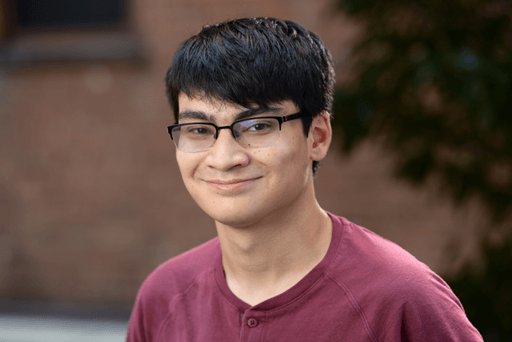Terran Potter is a summer intern at Mission of Love Charities. Prior to his present role, he was a student at Saint Mary’s College, where he obtained his B.S. in Psychology and Political Science. Potter is currently a graduate student at George Washington University, studying Public Administration. At the university, he is part of the Minority Leadership Program. This program “teaches minorities how to be leaders and it connects them to other leaders,” said Potter. A student named Shay recommended he join the Local Initiative Support Corporation (LISC). He did. LISC gave Potter a fellowship to work at Mission of Love Charities (MOLC).
At Mission of Love Charities, he met a community leader: Deborah Martinez, MOLC’s CEO. “She invited me to begin work at MOLC,” said Potter.
It’s not the first time Potter worked with a population in need. His hometown, Ellicott City, Maryland, is located in a valley. “Ellicott City was flooded twice in two years,” remembered Potter. “I helped with displaced people to clean out their homes. I organized supplies and gave them to people who needed them. It was a lot of cleaning and sorting,” he recalled. The people of Ellicott City were much different from the homeless population at MOLC. Yet the experience he gained in helping others gave him the understanding that day-to-day needs are a priority. Help from the community is necessary to survive a disaster.
Working with the homeless population is different than disaster survivors, yet people’s basic needs for food and housing are much the same. “At MOLC, we assist people in breaking the cycle. The cycle is a need for food and money to pay rent,” said Potter. Short-term needs must be met and MOLC assists with a food pantry that is open five days per week. When asked if he knew of other food banks that are open five days a week, Potter said, “No, I don’t know of any.”
While the food pantry “offers a temporary solution in giving much needed food, and the rental assistance program helps with housing, I feel long-term needs have to be met to elevate people out of poverty and homelessness,” he said candidly. Potter feels the work readiness programs MOLC offers, such as a free Certified Nursing Assistant certificate, aid in the long-term need of changing to a more stable lifestyle.
More than anything, Potter’s ultimate goal is to help MOLC’s clients out of a bad place. Because of the COVID-19 pandemic, many slipped into poverty who weren’t there before. “We always treat clients with dignity,” observed Potter. He is keenly aware that COVID-19 changed things for the worse, for many.
As part of Potter’s daily duties at MOLC, he works the floor, answering the telephone. He assists in distributing food at the food pantry, giving valuable food resources to people in genuine need. As part of his summer internship, Potter will also help with program evaluation. This means his academic background in Psychology will come into play. “How do we convince these people that joining a work readiness program will truly help them? The main objective is to get people to sign up for these programs to break the cycle of homelessness and poverty,” said Potter.
Up until his work at MOLC, his view on the cycle of poverty was mainly theoretical. Potter counts himself lucky to have come from a family where giving back to the community is a source of happiness and pride. “I come from a well-off family,” he observed. His parents work in the computer security field. “My parents help the Cub Scouts and Boy Scouts, the Parent Teachers Association (PTA) and schools as well as students. They taught me to count myself as lucky to have a good life. And, to give back to the community,” he said.
Potter lives in the Foggy Bottom neighborhood of Washington D.C. Many of his neighbors are students, like himself. “Every neighborhood has homeless people, not just Capitol Heights,” he said. Just down the street from his home, there’s a homeless camp. Capitol Heights is suburban and it’s obvious there are fewer financial resources there than Foggy Bottom. “There’s an abandoned school across the road from MOLC and a small shopping center,” Potter observed. The goal is to “to make a good impact on this community” he said, and “to help elevate those in need who live in Capitol Heights.”
One day, with the help of donations, the abandoned school will change. The former school was gifted to MOLC by Prince George’s County for use by the organization. The school will be renovated into a community space and become a hub for work readiness programs and other initiatives that help those impoverished groups.
Working on the floor and distributing essentials from the food pantry, Potter said, “We give out a large number of socks and hygiene kits to the homeless, too.” These items are in high demand for homeless individuals. “I want to help others in the process of living my own life,” declared Potter. His words are turned into actions working for MOLC.
Prior to his work at MOLC, much of his knowledge about non-profits was theoretical. “This is what homelessness actually looks like. Working for MOLC is much more grounded,” says Potter. Many of the clients he meets have needs that are not singular. “Here I am learning to be a good manager or administrator,” he says, “We get what needs to be done – done!”
More News
Greater Baden Medical Services and Mission of Love Charities Partner to Enhance Healthcare and Social Services in Prince George’s County
March 22, 2024
GBMS and MOLC partner to expand health and social services in Prince...
Read moreNewsletter – Issue 1 | 2024
February 1, 2024
Check out the newest edition of the MOLC newsletter!
Read moreJoin the movement “Give Today to Give Hope to Others Tomorrow!
November 28, 2023
This Giving Tuesday, we are urging you to join us in our endeavors by...
Read more